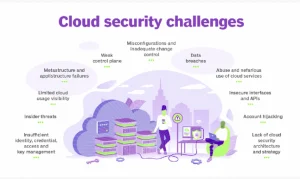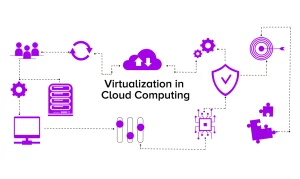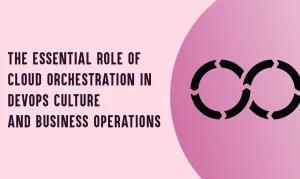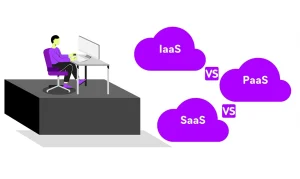When the term “Blockchain” is mentioned, many associate it solely with cryptocurrencies. However, this technology extends beyond digital currencies. Web3 and advanced applications harness the power of this distributed ledger technology. In Blockchain, transactions are recorded across a decentralized network, enhancing security and transparency.
Despite its benefits, Blockchain is not flawless, and like any technology, it has its challenges. Cloud computing emerges as a solution to address these challenges, providing a complementary approach. As the world embraces digitization, both Cloud and Blockchain are poised to shape the future. In this guide, explore how cloud computing can effectively tackle and overcome the challenges inherent in Blockchain technology. Discover the synergies between these two technologies in the evolving landscape of digitized transactions.
Table of Contents
What is Blockchain?

Imagine data organized in blocks and interconnected in a chain network. This robust digital infrastructure poses a formidable challenge to hacking or tracking. In technical terms, Blockchain comprises information containers known as blocks that store encrypted data. Often referred to as Distributed Ledger Technology (DLT), it earns this name due to its capacity for recording and tracking digital assets.
Where Blockchain Is Used?

In the digital age, one pressing challenge is ensuring the legitimacy of data, as misinformation can have widespread and detrimental effects on society. Consequently, various industry sectors are harnessing the power of Blockchain technology to address these concerns.
- Finance:
- Cryptocurrency stands as a prominent example of Blockchain application. However, the banking sector is increasingly adopting this advanced technology to secure global transactions. Blockchain streamlines account verification processes, offering a smoother experience. It also accelerates international payments, ensuring swift and secure transactions.
- Healthcare:
- The healthcare industry, dealing with sensitive patient information, faces the constant threat of data breaches. Blockchain, with its decentralized log of patient records, provides an impregnable barrier against hackers. This ensures data security, mitigating concerns related to data leakage and unauthorized access.
- Supply Chain Management:
- Supply chain disruptions often leave customers bewildered, especially when orders are canceled by vendors. Blockchain proves instrumental in enhancing the transparency and reliability of the connection between retailers and customers. It eliminates errors in supply chain management, allowing customers to make secure transactions and track their orders with precision.
What is Cloud Computing?

In the realm of evolving IT resources, businesses are adopting modern infrastructure, such as cloud computing, to efficiently handle data and information. This model is widely embraced by commercial organizations to safeguard their data and ensure seamless business operations.
In the context of cloud computing, a network of computers and servers is interconnected within a unified network, simplifying the process of accessing information.
Cloud technologies that strengthen Blockchain capabilities.

Public Cloud:
Blockchain’s relevance spans industries with IT operations, and Public Cloud technology facilitates remote user access to computing resources. This on-demand availability over the internet is particularly advantageous. Many Blockchain companies utilize application orchestration software like Kubernetes within this model. Managed Kubernetes, reducing hardware maintenance and time-to-market, is favored by Blockchain developers.
Private Cloud:
In the Private Cloud model, a server cluster employs specialized Hypervisor solutions. For cost-effective cloud hosting solutions for Blockchain apps, consider our affordable services. Notable solutions, such as Nutanix and VMware, construct these software infrastructures. These infrastructures automate disaster recovery backup and enable customized virtual networking. High availability and improved redundancy characterize these solutions. Their fault-tolerant design ensures functionality even if one node fails, eliminating single points of failure.
Why is Blockchain Cloud Necessary?

As information technology and communication sectors evolve, data storage and transmission methods change. Cloud storage, compared to IoT (Internet of Things), provides flexible storage with significant potential for increased efficiency. In Blockchain technology, numerous nodes continuously contribute to the chain, leading to an increased demand for cloud computing power.
Leveraging cloud infrastructure in Blockchain addresses certain associated risks. Here’s a quick overview:
Cloud servers restrict access to information, processes, and coding once data is uploaded.
Security and privacy concerns are paramount during data processing. Users relying on trusted cloud providers for data processing need to be aware of internal operation mechanisms. Blockchain in cloud computing is crucial to mitigate these concerns.
Understanding the Operation of Blockchain Cloud:

Blockchain as a Service (BaaS) hosts the Blockchain network in the Cloud, facilitating secure network management through Blockchain-based cloud computing.
Blockchain-enabled services, including smart contracts, user transaction verification, and cloud Blockchain storage, support IoT applications within this framework.
For Blockchain technology, a robust disaster recovery option is essential. Integration with cloud technology protects the Blockchain model from data insecurity vulnerabilities and disasters. Advanced cloud infrastructures also mitigate DDoS attacks effectively.
Conclusion
To overcome challenges, it’s crucial to form a robust partnership with your cloud provider and carefully select your Blockchain partner. MilesWeb, offering managed cloud hosting services, ensures a favorable ROI for your Blockchain model. Unlock the potential of top-notch cloud services featuring exemplary configurations, including SSD NVMe storage and ample bandwidth.
Related:- Everything About Blockchain Technology & Its Working







